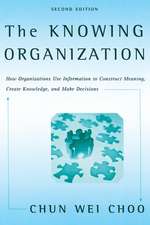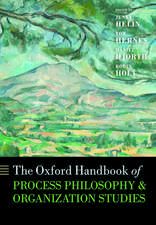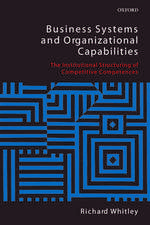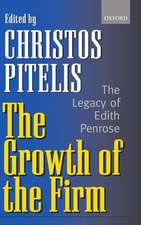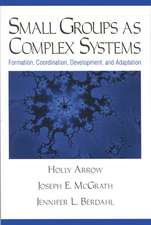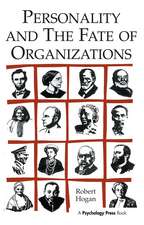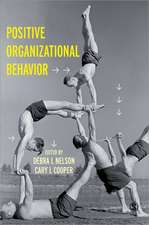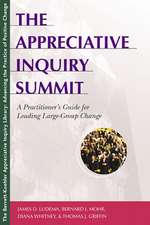A Process Theory of Organization
Autor Tor Hernesen Limba Engleză Paperback – 15 mai 2014
| Toate formatele și edițiile | Preț | Express |
|---|---|---|
| Paperback (1) | 336.30 lei 31-37 zile | |
| OUP OXFORD – 15 mai 2014 | 336.30 lei 31-37 zile | |
| Hardback (1) | 657.07 lei 31-37 zile | |
| OUP OXFORD – 14 mai 2014 | 657.07 lei 31-37 zile |
Preț: 336.30 lei
Nou
Puncte Express: 504
Preț estimativ în valută:
64.35€ • 67.19$ • 53.14£
64.35€ • 67.19$ • 53.14£
Carte tipărită la comandă
Livrare economică 04-10 aprilie
Preluare comenzi: 021 569.72.76
Specificații
ISBN-13: 9780199695089
ISBN-10: 0199695083
Pagini: 256
Dimensiuni: 171 x 238 x 15 mm
Greutate: 0.4 kg
Ediția:New ed.
Editura: OUP OXFORD
Colecția OUP Oxford
Locul publicării:Oxford, United Kingdom
ISBN-10: 0199695083
Pagini: 256
Dimensiuni: 171 x 238 x 15 mm
Greutate: 0.4 kg
Ediția:New ed.
Editura: OUP OXFORD
Colecția OUP Oxford
Locul publicării:Oxford, United Kingdom
Recenzii
The remarkable insights offered in this book provide a language and a style of analysis that help us move from process and reality to process as reality. Tor Hernes has captured the elusiveness of organizing in motion in a way that is unmatched. This book is a major accomplishment that enables all of us to be more observant and more skillful analysts who can now ask better questions about fleeting structures in an on-going present.
The time of structures is gone, but much of organization theory - and practice - holds compulsively to it. Tor Hernes' book will help theoreticians and practitioners to let go - and enter the world where fluid processes cross through the global economy.
This book is a refreshingly bold attempt to provide a genuinely alternative approach to the study and analysis of organization as precarious and temporary accomplishments; time and temporality feature significantly in its theoretical agenda. Hernes takes a step back and attempts to theorize organization on the basis that process itself is constitutive of reality. Hernes is to be complemented for undertaking such an ambitious endeavour in making us aware of the consequences of taking process and becoming seriously.
A world on the move and how to catch it without making it static; this is the big challenge that the book addresses. The author offers a great introduction to a process theory of organization since it makes evident how temporality is at the heart of organizational life, and how it should be studied.
The time of structures is gone, but much of organization theory - and practice - holds compulsively to it. Tor Hernes' book will help theoreticians and practitioners to let go - and enter the world where fluid processes cross through the global economy.
This book is a refreshingly bold attempt to provide a genuinely alternative approach to the study and analysis of organization as precarious and temporary accomplishments; time and temporality feature significantly in its theoretical agenda. Hernes takes a step back and attempts to theorize organization on the basis that process itself is constitutive of reality. Hernes is to be complemented for undertaking such an ambitious endeavour in making us aware of the consequences of taking process and becoming seriously.
A world on the move and how to catch it without making it static; this is the big challenge that the book addresses. The author offers a great introduction to a process theory of organization since it makes evident how temporality is at the heart of organizational life, and how it should be studied.
Notă biografică
Tor Hernes is Professor of Organization Theory at Copenhagen Business School and Vestfold University College, Norway, where he teaches and carries out research on process thinking and organization. He has published a dozen books as well as process related articles in top tier European and American journals. He is a leading figure in the emerging field of process thinking in organization studies. He is co-editor of the forthcoming Oxford Handbook of Process Philosophy and Organization Studies and co-chair of the EGOS Standing Working Group on process thinking and organization.


